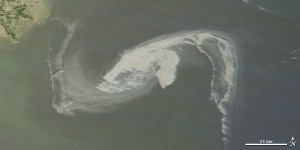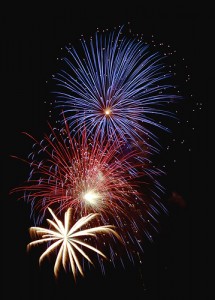
courtesy NASA
It’s day 77 of the Deepwater Horizon disaster. Let’s celebrate with 77 public health links about oil and health.
1. Oil Spill Human Health Research Coordinating Group at Louisiana State University Health Sciences Center-New Orleans
General public
2. CDC – Information for Coastal Residents – discusses the effect of the spill on food and water, and describes various oil smells and what health effects you may experience from inhaling them
3. CDC – Dispersants Quick Facts for Coastal Residents: Corexit 9500, 1,2-Propanediol, & other chemicals in the Gulf
4. Light crude oil and your health: CDC
5. Gulf Oil Spill Information for Pregnant Women (CDC)
6. Oil spill issues- Public information: what to do and why (FAQ from the Louisiana Dept. of health and hospitals) ÔÇô English
7. Oil spill issues-Public information: what to do and why (FAQ from the Louisiana Dept. of health and hospitals) ÔÇô Spanish
8. Oil spill issues-Public information: what to do and why (FAQ from the Louisiana Dept. of health and hospitals) ÔÇô Vietnamese
9. What you should and should not do in areas affected by the oil spill (Louisiana Dept. of health and hospitals) ÔÇô English
10. What you should and should not do in areas affected by the oil spill (from Louisiana Dept. of health and hospitals)- Spanish
11. What you should and should not do in areas affected by the oil spill (from Louisiana Dept. of health and hospitals) ÔÇô Vietnamese
12. Questions and Answers about the BP Oil Spill in the Gulf Coast (EPA)
13. Deepwater Horizon Oil Spill ÔÇô Texas Parks & Wildlife Department
14. Oil spill resources ÔÇô Louisiana Dept. of Public Health
15. Resources for individuals affected by oil spill ÔÇô Louisiana (food banks, support for children, BP claims/workforce assistance, homeowners insurance support and more )
16. Pubmed Search on oil spills and health
17. Odors from the BP Oil Spill (EPA) ÔÇô describes the different aromas & health effects, how to report
18. Table of Chemical Constituents Commonly Found in Crude Oil (CDC)
19. Florida Dept. of Environmental Protection ÔÇô Deepwater Horizon Response ÔÇô hotlines, FL response phone numbers, maps & surveillance
20. Disasterassistance.gov: file a BP claim
21. Gulf Oil Spill Health Hazards: chemicals and health effects (From Sciencecorps.org)
22. Crude Oil Spills and Health (National Library of Medicine)
23. Children and the oil spill ÔÇô American Academy of Pediatrics:
24. Gulf of Mexico Oil Spill Update (FDA): seafood safety
25. Volunteer ÔÇô Louisiana
26. Volunteer ÔÇô Mississippi
27. Volunteer ÔÇô Florida
28. Volunteer – Alabama
29. What are tarballs and how do they form? (NOAA):
30. Health and Safety Aspects of In-situ Burning of Oil (NOAA)
31. Oil Well
Fires (U.S. Army Center for Health Promotion and Preventive Medicine)
32. Exposure to Oil Fires/Oil Fire Smoke (U.S. Army Center for Health Promotion and Preventive Medicine)
33. Shoreline Assessment (NOAA) Photographs demonstrating oil spill terminology: Oil distribution Surface oiling, Surface oiling types, Sediment types, Shoreline types, Cleanup methods
Response workers
34. Safety and Training of Oil Spill Response Workers (National Institute of Environmental Health Sciences) awareness-level health and safety resource training tools in English, Spanish, and Vietnamese for response workers
35. Gulf Oil Spill 2010: Information for Response Workers (CDC)
36. Deepwater Horizon Guidance for Workers (NIOSH/OSHA)
37. Reducing Occupational Exposures while Working with Dispersants During the Deepwater Horizon Response (NIOSH/OSHA)
Maps
38. Beach advisories/status map ÔÇô Louisiana
39. Beach advisories/status map ÔÇô Florida
40. Beach advisories ÔÇô Alabama
41. Beach advisories-Mississippi
42. Beach advisories-Texas
43. Federal Fisheries Closure and Other Information (NOAA)
44. Where the oil is: A daily status of the Deepwater Horizon oil spill (US Fish and Wildlife Service)
45. NOAA interactive map: Environmental response management application (ERMA) ÔÇô (Very, very cool!)
46. Air monitoring on the Gulf Coast (EPA) air quality maps, reports
47. Coastal Water Sampling (EPA): maps, location analysis
48. Coastal Sediment Sampling (EPA): maps, analysis
49. Oil spill trajectory hindcast/forecast (Ocean Circulation Group and the Optical Oceanography Laboratory at College of Marine Science, University of South Florida)
50. OSHA’s Efforts to Protect Workers: interactive maps showing OSHA presence and chemical sampling in the Gulf
51. Oil spill crisis map (Louisiana Bucket Brigade and Tulane University)
Surveillance
52. NIOSH Report of BP Illness and Injury Data (April 23 ÔÇô June 6, 2010)
53. Press Release: REPORTING OF OIL SPILL-RELATED ILLNESSES & INJURIES TO THE LOUISIANA DEPARTMENT OF HEALTH & HOSPITALS (call 888-293-7020 or fax 225-342-8117)
54. Number of Patients Reporting Possible, Suspected, or Known Exposure to Oil in Baldwin and Mobile Counties (Alabama) by Week – link removed Jan.7, 2011
55. Monitoring and sampling information (BP)
56. The Oil Spill and Calls to Poison Centers – American Association of Poison control Centers (so far theyÔÇÖve received 621 exposure calls & 459 information calls. Louisiana has the highest number of calls):
57. Gulf oil spill health surveillance (CDC)
Chemicals and Dispersants
58. Oil Spill Dispersant (COREXIT ?«EC9500A and EC9527A) Information for Health Professionals
59. COREXIT?« EC9527A Material Safety Data Sheet (MSDS)
60. COREXIT?« EC9500A Material Safety Data Sheet (MSDS)
61. COREXIT?« EC9500A Technical Product bulletin (primary distributors, special handling information, physical properties like specific gravity, pH, toxicity, analysis for heavy metals etc )
62. COREXIT?« EC9527A Technical Product bulletin (primary distributors, special handling information, physical properties like specific gravity, pH, toxicity, analysis for heavy metals etc )
63. NIOSH Pocket Guide to Chemical Hazards
64. NIOSH Topic Page on 2-butoxyethanol (COREXIT EC9527A contains between 30-60% of 2-butoxyethanol, a dispersant chemical):
65. 2-butoxyethanol from the Hazardous Substances Databank: human health effects, emergency medical treatment, animal toxicity studies, environmental exposure, pharmacology, chemical properties, occupational exposure, etc.
66. 2-butoxyethanol from HazMap ÔÇô exposure assessment, adverse effects
67. Pubmed search on 2-butoxyethanol
68. Dispersants: a guided tour (NOAA)
Continue to #69-77, because our blogging software leaves much to be desired.

 myLSUHSC
myLSUHSC

